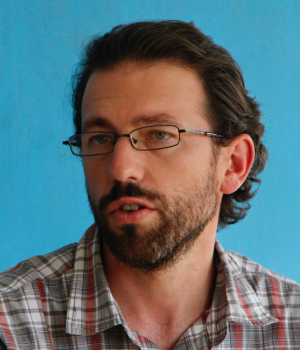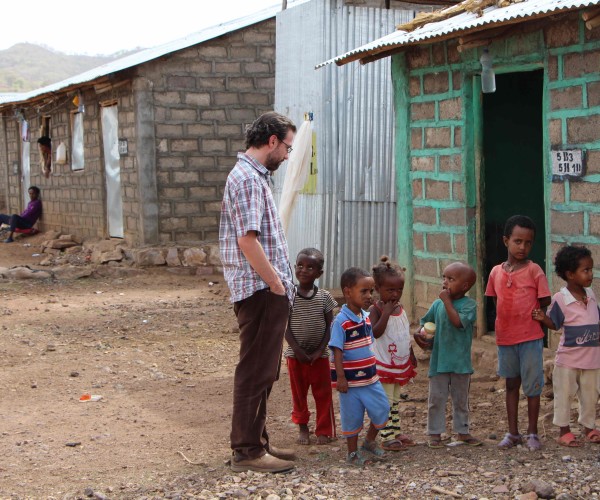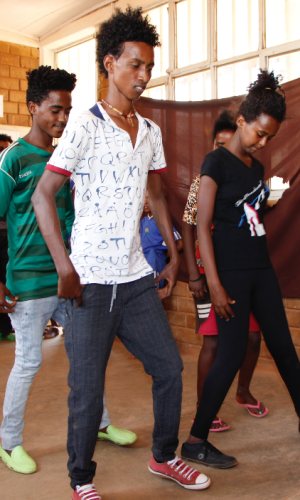By Emily Christensen
EVERY MONTH BETWEEN 200 AND 300 unaccompanied children arrive at one of four refugee camps operated by the United Nations High Commissioner for Refugees (UNHCR) near Shire, Ethiopia. They come seeking shelter and safety from a myriad of hardships and atrocities facing them in the neighboring country of Eritrea.
Jason Bell ’03 is often there to greet them. For four years, Bell, a best-interest determination specialist, has worked through the International Catholic Migration Commission (ICMC)-United Nations High Commissioner for Refugees Resettlement Deployment Scheme to help these children find a life offering the stability and security that is hard to come by in their own heavily militarized country.
“Each population has its own needs and issues depending on the country they are coming from and the problems they faced in those countries,” Bell said. “In Shire, we have about 2,000 children we are trying to help. It’s rare that you see this many unaccompanied children in one camp.”

Under scrutiny
In recent months, stories of refugees seeking asylum have flooded international media outlets, with the faces of those fleeing Syria dominating much of the coverage.
In the U.S. and abroad, those stories have been intermingled with media reports on the terrorist attacks in Paris in November and San Bernardino, Calif., in December. Though the Islamic State (formerly ISIS/ISIL) claimed responsibility for the Paris attacks, no connections have been made between either of the attacks and Syrian refugees.
Numerous lawmakers and U.S. governors have raised questions about the country’s vetting process for refugees, with several governors going so far as to say they would close down their states so refugees seeking asylum.
Bell finds the anti-refugee rhetoric distressing.
“There’s been a real fear, and a legitimate fear, that people have for their security when incidents like what happened in Paris and San Bernardino make the news,” he said. “They want to make sure people aren’t taking advantage of the program, but the reality is something very different.”
According to the U.S. government, refugees undergo a more rigorous vetting process than any other group entering the country. Since 2001, 750,000 refugees have been resettled in the United States. None have been convicted of carrying out a terrorist attack.
“Pointing toward refugees as a potential threat is not a good outlet for that fear. It also makes my work more difficult because we are trying to help the people who are fleeing the actual violence people here are so afraid of,” Bell said. “Refugees are being punished twice for that. They are suffering from having to leave their country and then the xenophobia that’s been prevalent in the media and around the U.S.”
These challenges make Bell’s work harder for the people he serves in Ethiopia—men, women, and children who have lived through difficulties he believes most Americans are unable to comprehend.
“I consider myself fortunate to be in a position to help others and give back to others who really need help,” he said. “I’m in a position where I am able to see the benefits of the work I am doing. I have seen several children resettled in new countries and placed in better surroundings and situations. That motivates me to continue with my work.”


In the field
Many of the unaccompanied children Bell works with in Ethiopia are actually young men seeking refuge from mandatory and sometimes indefinite military service.
Service begins no later than the young man’s 18th birthday and can begin much earlier. Refugees fleeing military service are unable to return to Eritrea, where a shoot-to-kill policy is maintained along the border. With no chance of returning to their homeland, the unaccompanied minors are left with only two options: pay smugglers to help them reach Europe or work with Bell to find a permanent home.
“We try to look for distant relatives or for people from the child’s home community who will take responsibility
for them, but that is usually quite difficult,” Bell said. “With the high number of people leaving on a secondary migration (seeking potentially illegal ways out of the country), it’s hard to convince them to take responsibility for another person.”
The process itself usually takes four to six weeks. Bell interviews the child and anyone who knows the child. Follow-ups might be needed.
He assesses the child’s living situation at the camp and then writes a report summarizing his findings. The report is reviewed by experts from several agencies who are charged with determining the best way forward for the child. Some children are united with family members in other refugee camps or around the world.
If the child is recommended for resettlement in another country, the wait for a placement can be much longer, usually six to 10 months. Resettlement placements for adults and families can take up to two years.
“The process is expedited some because of the urgency required with unaccompanied children,” Bell said. “There is no one to take care of them here, and they want the older children especially to be resettled so there is more support for them before they age out of the system.”
Most Eritrean youth recommended for resettlement find permanent placements in the U.S., where families obtain legal guardianship of them or they become part of a special government-run foster care program.
Those who operate the refugee camps rely on community-based care to help keep tabs on the unaccompanied minors while they wait. Children of a similar age and gender are housed together in groups of six to eight. The children in the home are responsible for providing basic needs and take turns preparing meals and cleaning the home. Families who live near the unaccompanied children can respond if there is a problem in the house. Trained refugee social workers—other refugees living in the same camp—also check in on the children to ensure their safety, distribute necessities, and make sure they are attending school.
Savoring the successes
Bell specifically remembers a December 2013 flight from Addis Ababa to the U.S.
Unbeknownst to him, five children from his camp were taking the same flight, the last leg in their journey to a new beginning.
“I had the chance to spend several hours discussing the new life awaiting them overseas,” he said. “The children had many questions about what life would be like. They also spoke of their desire to complete school. Being able to see these children get a chance for a better future gave me a renewed sense of motivation and fulfillment.”
He also treasures the videos, which have words of hope and encouragement from those who have already made the trek to the States, that are shared with children still in the refugee camp. Once in a while, he even sees a familiar face.
Though Bell had no idea that this was where his future would lead—he once considered a music major before switching gears to pursue political science and international relations—he’s thankful for an education that prepared him for whatever he decided to pursue.
“I’ve always been interested in government and political systems and cultures different from our own and how we relate,” Bell said. “I utilized the whole idea of a liberal arts education to try and learn about my interests and many different fields. That led me to a place where I am very happy and love what I am doing.”
